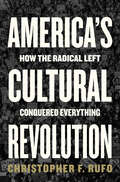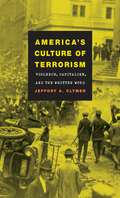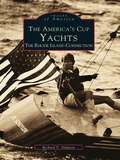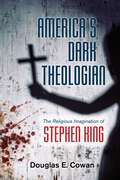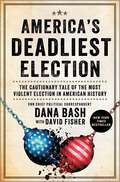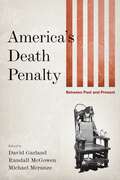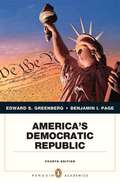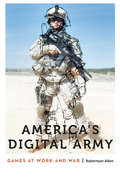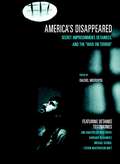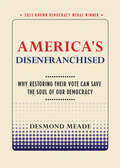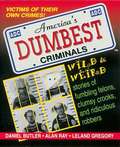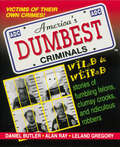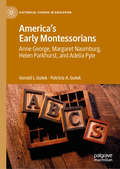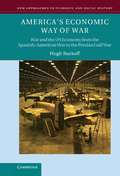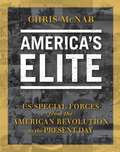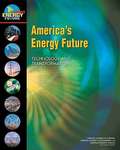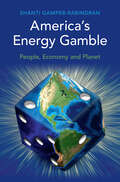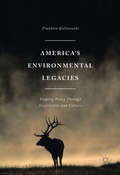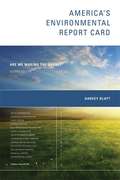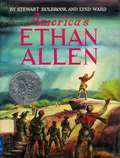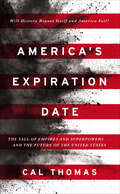- Table View
- List View
America's Cultural Revolution: How the Radical Left Conquered Everything
by Christopher F. RufoAN INSTANT NEW YORK TIMES, USA TODAY, AND AMAZON BESTSELLER America’s most effective conservative intellectual proves once and for all that Marxist radicals have taken over our nation's institutions.In the 1960s, Mao launched China’s Cultural Revolution. Cities grew overcrowded. Technocrats demanded progress from above. Anyone opposed was sent to be “re-educated.” China’s revolution was bloody, fast, and a failure, but what if America started a revolution at the same time, based on the same bad ideas, and it’s just been slower, calmer, and more effective?In his powerful new book, Christopher F. Rufo uncovers the hidden history of left-wing intellectuals and activists who systematically took control of America’s institutions to undermine them from within. America’s Cultural Revolution finally answers so many of the questions normal Americans have, such as:• Why is nearly every major corporation bending the knee to a far-left agenda?• How did DEI suddenly become the department no institution can continue without?• Why is race the main thing America’s rich, white elite wants to talk about? • When did the left adopt all this doublespeak, saying progress is a lack of progress, equality is not equality, speech is violence, and violence is speech?• Has the goal of the left, for a century, actually been the destruction of every Western institution? Readers may not know the names of Herbert Marcuse, Angela Davis, Paulo Freire, and Derrick Bell, but they will recognize the ideas they spread. How their radical, destructive ideology slowly worked its way from prisons to academia to classrooms to your human resources department will come as a shock.Failing to act soon, Rufo warns, could allow the radical left to achieve their ultimate objective: replacing constitutional equality with a race-based redistribution system overseen by bureaucratic ‘diversity and inclusion’ officials. Most Americans don’t want this, but most Americans are no longer in control of our institutions. If the mainstream media’s depiction of a failing dystopia in need of a fresh start never sounded right to you, this expose and call to arms is the book you’ve been looking for.
America's Culture of Terrorism
by Jeffory A. ClymerAlthough the terrorist attacks of 11 September 2001 shocked the world, America has confronted terrorism at home for well over a century. With the invention of dynamite in 1866, Americans began to worry about anonymous acts of mass violence in a way that differed from previous generations' fears of urban riots, slave uprisings, and mob violence. Focusing on the volatile period between the 1886 Haymarket bombing and the 1920 bombing outside J. P. Morgan's Wall Street office, Jeffory Clymer argues that economic and cultural displacements caused by the expansion of industrial capitalism directly influenced evolving ideas about terrorism.In America's Culture of Terrorism, Clymer uncovers the roots of American terrorism and its impact on American identity by exploring the literary works of Henry James, Ida B. Wells, Jack London, Thomas Dixon, and Covington Hall, as well as trial transcripts, media reports, and the cultural rhetoric surrounding terrorist acts of the day. He demonstrates that the rise of mass media and the pressures of the industrial wage-labor economy both fueled the development of terrorism and shaped society's response to it. His analysis not only sheds new light on American literature and culture a century ago but also offers insights into the contemporary understanding of terrorism.
America's Cup Yachts, The: The Rhode Island Connection
by Richard V. SimpsonThe dominance of the New York Yacht Club, in possession of the America's Cup between 1851 and 1983, has given Newport, Rhode Island, the status of yachting capital of the world. Seven of the most respected America's Cup defenders were built in Bristol, Rhode Island. The state's contribution to racing yacht technology began in Bristol, when N.G. Herreshoff designed and built the Vigilant in 1893. The Goetz Custom Sailboat Company continues the Bristol tradition of building superior sailing vessels, many of which have been challengers for the coveted America's Cup, beginning with the America 3 in 1992. In his sixth volume for the Images of America series, author Richard V. Simpson explores the allure of the America's Cup yachts and racing through more than 200 images from his own diverse collection. The photographs focus on the beauty and dignity of the yachts, the genius of engineering minds, and the handiwork of skilled crafters. Within these pages, view a variety of rare images captured by turn-of-the-century biograph and stereoscopic cameras, and experience the majestic dance of the yachts as they jockey for position, from the starting gun to the crossing of the finish line.
America's Cup in 2013: Oracle Team USA vs. Emirates Team New Zealand (A)
by Alan Maccormack Rory Mcdonald Vanessa AmpelasFour teams across the world are furiously designing, building, testing, and learning to sail a boat that would be one-of-a-kind, in order to win the 2013 America's Cup. Choosing the best development path was a challenge as the teams had less than three years to prepare, and each decision would affect the performance of the boat as well as the duration of the sailors' training. The case traces the dilemma faced by the favorite, ORACLE TEAM USA (OTUSA), as rumors grew that the challenger was pursuing a revolutionary technology that would enable its six-ton boat to literally fly above waves. With only a year left before the Cup, should OTUSA keep refining its current technology called "skimming", or should it pivot towards "foiling" (flying)? At this stage "foiling" could be a red herring, and even if it was not, the limits of the performance of a foiling boat would remain a mystery for some time. The case explores the dilemma of managing innovation in an uncertain environment, where the decision would be sanctioned a year later by a win or a loss.
America's Cup in 2013: Oracle Team USA vs. Emirates Team New Zealand (A)
by Alan Maccormack Rory Mcdonald Vanessa AmpelasFour teams across the world are furiously designing, building, testing, and learning to sail a boat that would be one of a kind, in order to win the 2013 America's Cup. Choosing the best development path was a challenge as the teams had less than three years to prepare, and each decision would affect the performance of the boat as well as the duration of the sailors' training. The case traces the dilemma faced by the favorite, ORACLE TEAM USA (OTUSA), as rumors grew that the challenger was pursuing a revolutionary technology that would enable its six-ton boat to literally fly above waves. With only a year left before the Cup, should OTUSA keep refining its current technology called "skimming", or should it pivot towards "foiling" (flying)? At this stage foiling could be a red herring, and even if it was not, the limits of the performance of a foiling boat would remain a mystery for some time. The case explores the dilemma of managing innovation in an uncertain environment, where the decision would be sanctioned a year later by a win or a loss.
America's Dark Theologian: The Religious Imagination of Stephen King
by Douglas E. CowanIlluminating the religious and existential themes in Stephen King’s horror stories Who are we? Why are we here? Where do we go when we die? For answers to these questions, people often look to religion. But religion is not the only place seekers turn. Myths, legends, and other stories have given us alternative ways to address the fundamental quandaries of existence. Horror stories, in particular, with their focus on questions of violence and mortality, speak urgently to the primal fears embedded in such existential mysteries. With more than fifty novels to his name, and hundreds of millions of copies sold, few writers have spent more time contemplating those fears than Stephen King. Yet despite being one of the most widely read authors of all time, King is woefully understudied. America’s Dark Theologian is the first in-depth investigation into how King treats religion in his horror fiction. Considering works such as Carrie, The Dead Zone, Misery, The Shining, and many more, Douglas Cowan explores the religious imagery, themes, characters, and, most importantly, questions that haunt Stephen King’s horror stories. Religion and its trappings are found throughout King’s fiction, but what Cowan reveals is a writer skeptical of the certainty of religious belief. Describing himself as a “fallen away” Methodist, King is less concerned with providing answers to our questions, than constantly challenging both those who claim to have answers and the answers they proclaim. Whether he is pondering the existence of other worlds, exploring the origins of religious belief and how it is passed on, probing the nature of the religious experience, or contemplating the existence of God, King invites us to question everything we think we know.
America's Deadliest Election: The Cautionary Tale of the Most Violent Election in American History
by Dana BashThe violent election of 1872 that serves as a warning for today's divided politics. <P><P> From CNN’s Chief Political Correspondent Dana Bash, the fast-paced story of the extraordinary election that led to hundreds of murders, warfare in the streets of New Orleans, two governors of Louisiana—and changed the course of politics in our country. <P><P> The Election of 1872 was the most contentious in American history. After both parties complained of corruption, neither candidate would concede, two governors claimed office and chaos erupted. Rival newspapers engaged in a bitter war of words, politicians plotted to overthrow the government, and their supporters fought in the streets and attempted assassinations. The entire country watched in grim fascination as the wounds of the Civil War were ripped open and the promise of President Grant’s Reconstruction faltered in the face of violent resistance and the birth of the Ku Klux Klan. <P><P> In this riveting book, Dana Bash and David Fisher tell the incredible, little-known story of the election that pushed democracy to the breaking point, and sparked historic events including: <P><P> The Colfax Massacre, in which at least 150 Black men were killed by white supremacists The extraordinary train race from New York to New Orleans for control of the state government The election of the first black Congressman from Louisiana in the face of violent resistance The Supreme Court ruling that ended Reconstruction and became the foundation of Southern segregation, changing the American legal system for the next century Readers will find eerie parallels to today's divided political landscape and leaders willing to seize power no matter the cost. An eye-opening warning of what's at stake and what it takes to protect our democracy, this is a must-read tale of America's deadliest election. <p> <b>New York Times Bestseller</b>
America's Death Penalty: Between Past and Present
by David Garland Michael Meranze Randall McGowenOver the past three decades, the United States has embraced the death penalty with tenacious enthusiasm. While most of those countries whose legal systems and cultures are normally compared to the United States have abolished capital punishment, the United States continues to employ this ultimate tool of punishment. The death penalty has achieved an unparalleled prominence in our public life and left an indelible imprint on our politics and culture. It has also provoked intense scholarly debate, much of it devoted to explaining the roots of American exceptionalism.America’s Death Penalty takes a different approach to the issue by examining the historical and theoretical assumptions that have underpinned the discussion of capital punishment in the United States today. At various times the death penalty has been portrayed as an anachronism, an inheritance, or an innovation, with little reflection on the consequences that flow from the choice of words. This volume represents an effort to restore the sense of capital punishment as a question caught up in history. Edited by leading scholars of crime and justice, these original essays pursue different strategies for unsettling the usual terms of the debate. In particular, the authors use comparative and historical investigations of both Europe and America in order to cast fresh light on familiar questions about the meaning of capital punishment. This volume is essential reading for understanding the death penalty in America.Contributors: David Garland, Douglas Hay, Randall McGowen, Michael Meranze, Rebecca McLennan, and Jonathan Simon.
America's Democratic Republic (Fourth Edition)
by Edward S. Greenberg Benjamin I. PageUpdated in a new 4th edition, America's Democratic Republic is a brief, affordable book in an accessible trade-like format that explores the clash between the democratic aspirations of the American people and the republican foundations of our Constitution. Written with a lively, narrative style, this text traces the storyline of American government and focuses on the long standing and inescapable tension between the country's 18th century republican Constitutional foundations and the democratic aspirations of the American people.
America's Digital Army: Games at Work and War (Anthropology of Contemporary North America)
by Robertson AllenAmerica’s Digital Army is an ethnographic study of the link between interactive entertainment and military power, drawing on Robertson Allen’s fieldwork observing video game developers, military strategists, U.S. Army marketing agencies, and an array of defense contracting companies that worked to produce the official U.S. Army video game, America’s Army. Allen uncovers the methods by which gaming technologies such as America’s Army, with military funding and themes, engage in a militarization of American society that constructs everyone, even nonplayers of games, as virtual soldiers available for deployment.America’s Digital Army examines the army’s desire for “talented” soldiers capable of high-tech work; beliefs about America’s enemies as reflected in the game’s virtual combatants; tensions over best practices in military recruiting; and the sometimes overlapping cultures of gamers, game developers, and soldiers. Allen reveals how binary categorizations such as soldier versus civilian, war versus game, work versus play, and virtual versus real become blurred—if not broken down entirely—through games and interactive media that reflect the U.S. military’s ludic imagination of future wars, enemies, and soldiers.
America's Dirty Wars
by Russell CrandallThis book examines the long, complex experience of American involvement in irregular warfare. It begins with the American Revolution in 1776 and chronicles big and small irregular wars for the next two and a half centuries. Examples taken from the American experience reveal that fighting - and, more so, winning - all types of wars is extraordinarily complex, frustrating, controversial and bloody. What is readily apparent in dirty wars is that failure is painfully tangible while success is often amorphous. Successfully fighting these wars often entails striking a critical balance between military victory and politics. America's status as a democracy only serves to make fighting - and, to a greater degree, winning - these irregular wars even harder. Rather than futilely insisting that Americans should not or cannot fight this kind of irregular war, Russell Crandall argues that we would be better served by considering how we can do so as cleanly and successfully as possible.
America's Disappeared: Secret Imprisonment, Detainees, and the War on Terror (Open Media Series)
by Barbara Olshansky Steven Macpherson Watt Reed Brody Rachel Meeropol Michael RatnerThe confirmation proceedings for Alberto R. Gonzales and Condeleezza Rice, like the Abu Ghraib prison scandal, triggered a national debate about the U.S. government's controversial treatment of detainees and its practice of torture. At the heart of the debate is the question: Is the United States undermining democracy, freedom, and human rights in it's effort to protect its citizens from terrorism? The authors of AMERICA'S DISAPPEARED answer, yes.AMERICA'S DISAPPEARED describes how the U.S. government, in response to the events of 9/11, launched an unprecedented campaign of racial profiling, detentions, and deportations so grievous as to evoke the internment of Japanese Americans during World War II. It brings together, for the first time, detainees' own testimonies along with analysis by the leading constitutional attorneys and human rights advocates. In addition to a detailed exploration of detention--the forms currently in use, and the conditions of each--the book challenges the Bush administration's justifications for violating the Geneva Conventions and the most basic definitions of human rights.
America's Disenfranchised: Why Restoring Their Vote Can Save the Soul of Our Democracy (Brown Democracy Medal)
by Desmond MeadeThe Lawrence and Lynne Brown Democracy Medal, presented by the McCourtney Institute for Democracy at Penn State, recognizes outstanding individuals, groups, and organizations that produce innovations to further democracy in the United States or around the world. Voting is foundational in a democracy, yet over six million American citizens remain stripped of their ability to participate in elections. Once convicted of a felony, people who complete their sentences reenter society, but no longer with the civil rights they once had. They may return to school, secure employment to provide for their families, and become law-abiding, tax-paying citizens—sometimes for decades—and still be denied the voting rights afforded to every other citizen.Desmond Meade, director of the Florida Rights Restoration Coalition and a returning citizen himself, played an instrumental role in the landslide 2018 Amendment 4 victory in Florida, which used the ballot box to restore voting rights to 1.4 million Floridians with a previous felony conviction. Meade argues how, state by state, America can do better. His efforts in Florida present a compelling argument that creating access to democracy for those living on the fringes of society will create a more vibrant and robust democracy for all. He is the winner of the 2021 Brown Democracy Medal for his continuing work to restore voting rights and connect Americans along shared social values.
America's Dumbest Criminals
by Daniel Butler Leland Gregory Alan RayBASED ON TRUE STORIES FROM LAW ENFORCEMENT OFFICIALS ACROSS THE COUNTRY
America's Dumbest Criminals: Wild & Weird Stories of Fumbling Felons, Clumsy Crooks, and Ridiculous Robbers
by Daniel Butler Leland Gregory Alan Ray100 crazy stories of America's dumbest criminals. WARNING: The crimes you are about to read are true. The names have been changed . . . to protect the ignorant.Here is the ultimate collection of the most incredibly stupid and painfully dumb attempts at crime ever brought together.The woman who invalidated her winning $5,000 lottery ticket by altering it to match the $20 prize numberThe accused vending-machine thief who paid his $400 bail entirely in quartersThe streaking robber who thought clothes would make him more identifiableThe convenience store thief who got away with just a hotdog, only to end up in the parking lot choking on the wiener
America's Early Montessorians: Anne George, Margaret Naumburg, Helen Parkhurst and Adelia Pyle (Historical Studies in Education)
by Gerald L. Gutek Patricia A. GutekThis book traces the early history of the Montessori movement in the United States through the lives and careers of four key American women: Anne George, Margaret Naumburg, Helen Parkhurst, and Adelia Pyle. Caught up in the Montessori craze sweeping the United States in the Progressive era, each played a significant role in the initial transference of Montessori education to America and its implementation from 1910 to 1920. Despite the continuing international recognition of Maria Montessori and the presence of Montessori schools world-wide, Montessori receives only cursory mention in the history of education, especially by recognized historians in the field and in courses in professional education and teacher preparation. The authors, in seeking to fill this historical void, integrate institutional history with analysis of the interplay and tensions between these four women to tell this educational story in an interesting—and often dramatic—way.
America's Economic Way of War: War and the US Economy from the Spanish-American War to the First Gulf War
by Hugh RockoffHow did economic and financial factors determine how America waged war in the twentieth century? This important new book exposes the influence of economics and finance on the questions of whether the nation should go to war, how wars would be fought, how resources would be mobilized, and the long-term consequences for the American economy. Ranging from the Spanish-American War to the Gulf War, Hugh Rockoff explores the ways in which war can provide unique opportunities for understanding the basic principles of economics as wars produce immense changes in monetary and fiscal policy and so provide a wealth of information about how these policies actually work. He shows that wars have been more costly to the United States than most Americans realize as a substantial reliance on borrowing from the public, money creation and other strategies to finance America's war efforts have hidden the true cost of war.
America's Economic Way of War: War and the US Economy from the Spanish-American War to the Persian Gulf War
by Hugh RockoffHow did economic and financial factors determine how America waged war in the twentieth century? This important new book exposes the influence of economics and finance on the questions of whether the nation should go to war, how wars would be fought, how resources would be mobilized, and the long-term consequences for the American economy. Ranging from the Spanish-American War to the Gulf War, Hugh Rockoff explores the ways in which war can provide unique opportunities for understanding the basic principles of economics as wars produce immense changes in monetary and fiscal policy and so provide a wealth of information about how these policies actually work. He shows that wars have been more costly to the United States than most Americans realize as a substantial reliance on borrowing from the public, money creation and other strategies to finance America's war efforts have hidden the true cost of war.
America's Elite: US Special Forces from the American Revolution to the Present Day
by Chris McnabFrom Roger's Rangers to the Revolution, Civil War, World War I & II, Korea, Vietnam, Iraq, Afghanistan, and the Bin Laden raid, this book covers over 250 years of American Special Forces action. America's Elite takes the reader through some of the most dramatic special forces operations in US history, from sniping British commanders during the Revolutionary War to Riverine incursions in the Mekong Delta in Vietnam, and from demolition missions on D-Day to the SEAL assault on Osama bin Laden's compound in 2011. Training and selection procedures are explained in detail, and the book also describes some of the technologies that have separated regular soldiers from their Special Forces counterparts. Illustrated throughout with striking photography and artworks, America's Elite forms the most comprehensive and visually impressive single-volume guide to US Special Forces available.
America's Energy Future: Technology and Transformation
by National Academy of Science National Academy of Enegineering National Research Council of the National AcademiesEnergy touches our lives in countless ways and its costs are felt when we fill up at the gas pump, pay our home heating bills, and keep businesses both large and small running. There are long-term costs as well: to the environment, as natural resources are depleted and pollution contributes to global climate change, and to national security and independence, as many of the world's current energy sources are increasingly concentrated in geopolitically unstable regions. The country's challenge is to develop an energy portfolio that addresses these concerns while still providing sufficient, affordable energy reserves for the nation. The United States has enormous resources to put behind solutions to this energy challenge; the dilemma is to identify which solutions are the right ones. Before deciding which energy technologies to develop, and on what timeline, we need to understand them better. America's Energy Future analyzes the potential of a wide range of technologies for generation, distribution, and conservation of energy. This book considers technologies to increase energy efficiency, coal-fired power generation, nuclear power, renewable energy, oil and natural gas, and alternative transportation fuels. It offers a detailed assessment of the associated impacts and projected costs of implementing each technology and categorizes them into three time frames for implementation.
America's Energy Gamble: People, Economy and Planet
by Shanti Gamper-RabindranHow can America get back to an energy transition that's good for the economy and the environment? That's the question at the heart of this eye-opening and richly informative dissection of the Trump administration's energy policy. The policy was ardently pro-fossil fuel and ferociously anti-regulation, implemented by manipulating science and economic analysis, putting oil and gas insiders at the helm of environmental agencies, and hacking away at democratic norms that once enjoyed bipartisan support. The impacts on the nation's health, economy, and environment were - as this book carefully demonstrates - dire. But the damage can be reversed. Ordinary Americans, civil society groups, environmental professionals, and politicians at every level all have parts to play in making sure the needed energy transition leaves no one behind. This compelling book will appeal to course instructors and students, government and industry officials, activists and journalists, and everyone concerned about the nation's future.
America's Environmental Legacies: Shaping Policy through Institutions and Culture
by Franklin KalinowskiThis powerful book focuses on the capacity of the American political system to respond to ecological challenges through policy perspectives, the constraints of our written Constitution, and the determination we muster to address these tests of national character. Put simply, this is a book about politics, policy, and political will. Kalinowski brilliantly shows that America's collective will is founded in the cultural values enunciated by the Founding Fathers, passed down through history with modifications, and comprises the essential missing ingredient in determining how we currently respond to crises. Thomas Jefferson, Alexander Hamilton, and James Madison had distinct ideas concerning the role that Nature might play in the future. Recognizing the origins and impacts of their environmental legacies is the key to interpreting where American environmental politics is today, how we got here, and where we might be headed.
America's Environmental Report Card
by Harvey BlattA timely survey of the state of America's environment: how we can take action to achieve a sustainable future.
America's Ethan Allen
by Stewart H. HolbrookThis book presents the life and legends of Colonel Ethan Allen and Green Mountain boys of the American Revolution.
America's Expiration Date: The Fall of Empires and Superpowers . . . and the Future of the United States
by Cal ThomasA warning and a wake-up call to learn history so we are not doomed to repeat it. A must-read for anyone who longs for a promising future for our great nation.What is wrong with America today? Is it possible that America could crumble and our democracy fail?Questions like these plague Americans and cause us to be anxious about the future of the "land that we love." Individuals may come to different conclusions, but there seems to be a common thread - the deep-seated feeling that we need to improve our country. Our culture is increasingly immoral, the family structure is threatened from all sides, and government programs consistently overreach, creating massive debt.In this powerful and prophetic book, nationally syndicated columnist and trusted political commentator Cal Thomas offers a diagnosis of what exactly is wrong with the United States by drawing parallels to once-great empires and nations that declined into oblivion. Citing the historically proven 250-year pattern of how superpowers rise and fall, he predicts that America's expiration date is just around the corner and shows us how to escape their fate.Through biblical insights and hard-hitting truth, he reminds us that real change comes when America looks to God instead of Washington. Scripture, rather than politics, is the GPS he uses to point readers to the right road - a road of hope, life, and change. Because, he says, if we're willing to seek God first, learn from history, and make changes at the individual and community level, we can not only survive, but thrive, again.This powerful, timely, and much-needed perspective is a must-read for anyone who longs for a promising future for our great nation.
